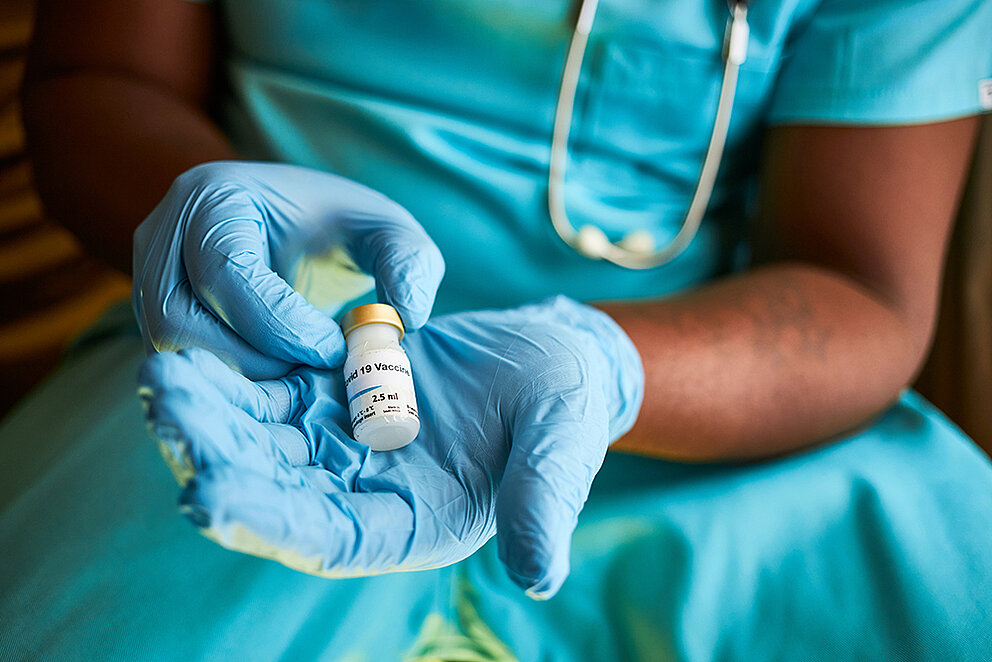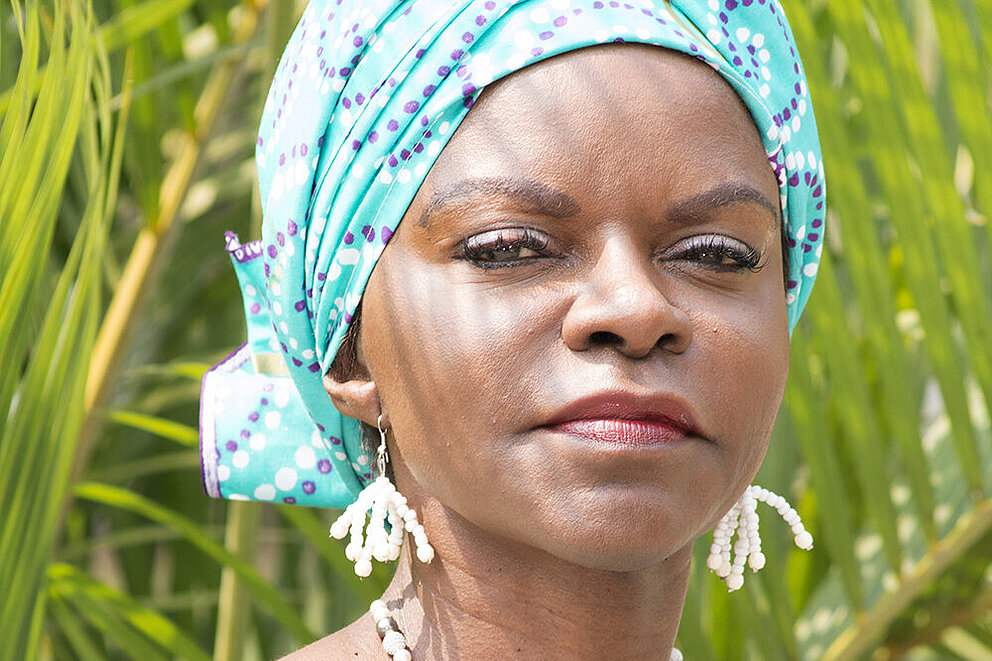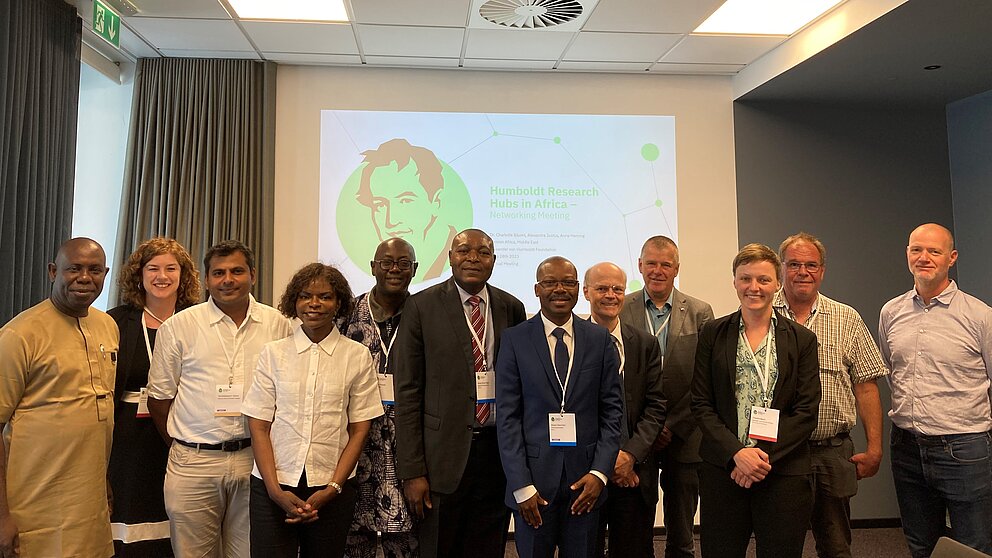Since 1953, the Humboldt Foundation has been bringing the best researchers to Germany from all over the world. The Foundation is thus a catalyst for progress and understanding. Our sponsorship recipients tackle the global challenges – they follow their ideas and generate valuable knowledge. More than 30,000 researchers in the Humboldt Network build bridges, do pioneering work, shape the world of tomorrow. Here you can get to know some of them. People who make a difference.
Fighting tomorrow’s pandemics: Research Hubs in Africa
According to the World Health Organisation (WHO), Covid-19 still poses a worldwide threat. Apart from the risk of new variants, there is an increasing probability that further pandemics, which are often caused by zoonoses, will occur. Human intervention in ecosystems, the effects of intensive livestock farming and the global trade in wild animals are in no small part responsible for expediting the transfer of diseases from animals to humans and thus the emergence of new infectious diseases. Research into Covid vaccines has demonstrated the crucial role played by science in fighting pandemics.

Contact
Press, Communications and Marketing
Tel.: +49 228 833-144
Fax: +49 228 833-441
presse[at]avh.de

With its six Humboldt Research Hubs in five African countries the Humboldt Foundation supports projects that aim to overcome the pandemics of today and tomorrow, at the same time reinforcing German-African research cooperation. The research centres cover a broad spectrum. They investigate, amongst other things, the role of social factors in fighting infectious diseases, possible ways of containing Covid-19, the impact of the coronavirus on co-infections like malaria, HIV and tuberculosis as well as the emergence of endemic and new arboviral threats.
In our network, there are many excellent researchers who drive progress and development in their native countries – particularly in Africa. Their efforts range from the fight against diseases like malaria and extend to work to promote democracy and women’s rights all the way to developing technologies for green energy or for protecting the environment and people’s health. Research in Germany is losing out because we often do not know of this potential and do not integrate it enough.
In the words of Georg Forster Research Award winner, Francine Ntoumi, the research hubs in Africa are an important tool in promoting young researchers, helping to prevent brain drain in the regions and keep young leaders in their countries. She heads the Humboldt Research Hub in Brazzaville in the Republic of Congo. Currently, 48 junior researchers, of whom 22 are women, work at the six research centres. The objective is to create better prospects and continuing education opportunities for young researchers.
Even more efforts are supposed to be made to recruit women, in particular, into research. Ntoumi believes this must begin at school and in cultural education. “It is necessary to create a change in the mindset in many countries at a much earlier age. That is why we are going into schools to raise awareness and change the stereotypes in the minds of girls so that they see that it is something very positive for women to become scientists. This will also help science in general. But we also need scientific leadership programmes so that the women can learn certain skills to advance their careers.”
Steffen Borrmann, Professor in the Institute for Tropical Medicine at Tübingen University Hospital and Francine Ntoumi’s German collaborative partner, argues in favour of simplified funding procedures and more sensitivity to combining work and family life. “If there were fewer extra hours required for higher positions, this would also attract more women to science.”

That said, the Humboldt Foundation’s sponsorship ensures that researchers are able to work in the first place. James Olukayode Olopade, head of the Humboldt Research Hub in Ibadan, Nigeria, emphasises that frequent power outages severely hamper the everyday life of researchers in Nigeria and many other African countries. In Ibadan this challenge has been met by using the funding to install two solar powered inverters. This has been a critical infrastructure to cold chain storage of samples in the Hub, and a support for other researchers in the University who need help with short term cold storage. But, according to Olopade, it is also cooperation within Africa that is pointing the way forward and helping to pool expertise.
Thus, the African heads and German collaborative partners in the research hubs got together in Berlin in June 2023 to share experience and plan future collaborations. Apart from local challenges at the individual hubs, they addressed South-South cooperation as well as targeted measures to promote young researchers and especially women. Moreover, ideas were aired for a joint networking conference involving all six Humboldt Research Hubs in Africa.

At the time, a new call for applications for Humboldt Research Hubs is not possible. Continued financing is being sought.
Research Hubs in Africa
A Humboldt Research Hub enables Humboldt Foundation alumni working in leading academic positions at African universities and research institutions to conduct long-term research projects with particular relevance to overcoming pandemics. To this end, they choose collaborative partners in Germany and may also include a further collaborative partner working in a leading academic position in an African country. The aim is that the alumnae/alumni should engage in successful international cooperation as heads of Humboldt Research Hubs and be invited to conduct their research projects at partner institutions in Germany. Junior researchers, who might be potential applicants for an Alexander von Humboldt Foundation research fellowship, are also integrated in these exchange activities. For additional information on the existing research hubs, visit here.
